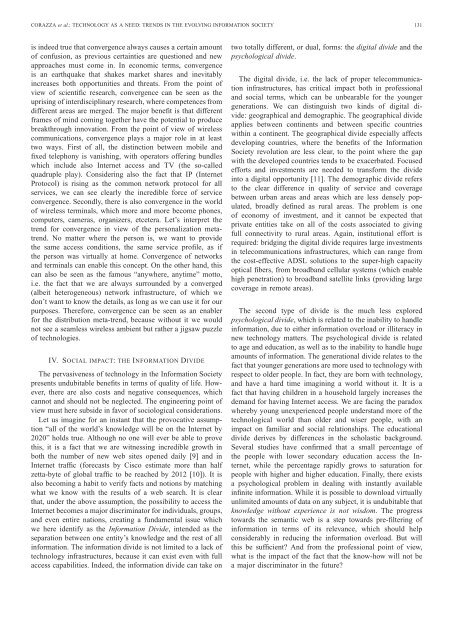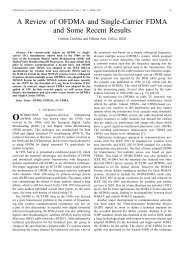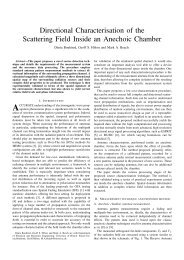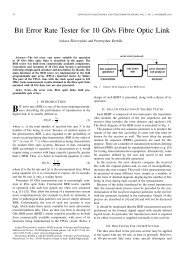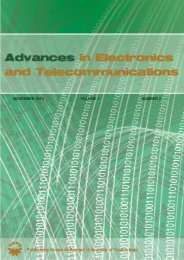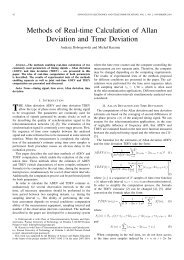channel - Advances in Electronics and Telecommunications
channel - Advances in Electronics and Telecommunications
channel - Advances in Electronics and Telecommunications
You also want an ePaper? Increase the reach of your titles
YUMPU automatically turns print PDFs into web optimized ePapers that Google loves.
CORAZZA et al.: TECHNOLOGY AS A NEED: TRENDS IN THE EVOLVING INFORMATION SOCIETY 131<br />
is <strong>in</strong>deed true that convergence always causes a certa<strong>in</strong> amount<br />
of confusion, as previous certa<strong>in</strong>ties are questioned <strong>and</strong> new<br />
approaches must come <strong>in</strong>. In economic terms, convergence<br />
is an earthquake that shakes market shares <strong>and</strong> <strong>in</strong>evitably<br />
<strong>in</strong>creases both opportunities <strong>and</strong> threats. From the po<strong>in</strong>t of<br />
view of scientific research, convergence can be seen as the<br />
upris<strong>in</strong>g of <strong>in</strong>terdiscipl<strong>in</strong>ary research, where competences from<br />
different areas are merged. The major benefit is that different<br />
frames of m<strong>in</strong>d com<strong>in</strong>g together have the potential to produce<br />
breakthrough <strong>in</strong>novation. From the po<strong>in</strong>t of view of wireless<br />
communications, convergence plays a major role <strong>in</strong> at least<br />
two ways. First of all, the dist<strong>in</strong>ction between mobile <strong>and</strong><br />
fixed telephony is vanish<strong>in</strong>g, with operators offer<strong>in</strong>g bundles<br />
which <strong>in</strong>clude also Internet access <strong>and</strong> TV (the so-called<br />
quadruple play). Consider<strong>in</strong>g also the fact that IP (Internet<br />
Protocol) is ris<strong>in</strong>g as the common network protocol for all<br />
services, we can see clearly the <strong>in</strong>credible force of service<br />
convergence. Secondly, there is also convergence <strong>in</strong> the world<br />
of wireless term<strong>in</strong>als, which more <strong>and</strong> more become phones,<br />
computers, cameras, organizers, etcetera. Let’s <strong>in</strong>terpret the<br />
trend for convergence <strong>in</strong> view of the personalization metatrend.<br />
No matter where the person is, we want to provide<br />
the same access conditions, the same service profile, as if<br />
the person was virtually at home. Convergence of networks<br />
<strong>and</strong> term<strong>in</strong>als can enable this concept. On the other h<strong>and</strong>, this<br />
can also be seen as the famous “anywhere, anytime” motto,<br />
i.e. the fact that we are always surrounded by a converged<br />
(albeit heterogeneous) network <strong>in</strong>frastructure, of which we<br />
don’t want to know the details, as long as we can use it for our<br />
purposes. Therefore, convergence can be seen as an enabler<br />
for the distribution meta-trend, because without it we would<br />
not see a seamless wireless ambient but rather a jigsaw puzzle<br />
of technologies.<br />
IV. SOCIAL IMPACT: THE INFORMATION DIVIDE<br />
The pervasiveness of technology <strong>in</strong> the Information Society<br />
presents undubitable benefits <strong>in</strong> terms of quality of life. However,<br />
there are also costs <strong>and</strong> negative consequences, which<br />
cannot <strong>and</strong> should not be neglected. The eng<strong>in</strong>eer<strong>in</strong>g po<strong>in</strong>t of<br />
view must here subside <strong>in</strong> favor of sociological considerations.<br />
Let us imag<strong>in</strong>e for an <strong>in</strong>stant that the provocative assumption<br />
“all of the world’s knowledge will be on the Internet by<br />
2020” holds true. Although no one will ever be able to prove<br />
this, it is a fact that we are witness<strong>in</strong>g <strong>in</strong>credible growth <strong>in</strong><br />
both the number of new web sites opened daily [9] <strong>and</strong> <strong>in</strong><br />
Internet traffic (forecasts by Cisco estimate more than half<br />
zetta-byte of global traffic to be reached by 2012 [10]). It is<br />
also becom<strong>in</strong>g a habit to verify facts <strong>and</strong> notions by match<strong>in</strong>g<br />
what we know with the results of a web search. It is clear<br />
that, under the above assumption, the possibility to access the<br />
Internet becomes a major discrim<strong>in</strong>ator for <strong>in</strong>dividuals, groups,<br />
<strong>and</strong> even entire nations, creat<strong>in</strong>g a fundamental issue which<br />
we here identify as the Information Divide, <strong>in</strong>tended as the<br />
separation between one entity’s knowledge <strong>and</strong> the rest of all<br />
<strong>in</strong>formation. The <strong>in</strong>formation divide is not limited to a lack of<br />
technology <strong>in</strong>frastructures, because it can exist even with full<br />
access capabilities. Indeed, the <strong>in</strong>formation divide can take on<br />
two totally different, or dual, forms: the digital divide <strong>and</strong> the<br />
psychological divide.<br />
The digital divide, i.e. the lack of proper telecommunication<br />
<strong>in</strong>frastructures, has critical impact both <strong>in</strong> professional<br />
<strong>and</strong> social terms, which can be unbearable for the younger<br />
generations. We can dist<strong>in</strong>guish two k<strong>in</strong>ds of digital divide:<br />
geographical <strong>and</strong> demographic. The geographical divide<br />
applies between cont<strong>in</strong>ents <strong>and</strong> between specific countries<br />
with<strong>in</strong> a cont<strong>in</strong>ent. The geographical divide especially affects<br />
develop<strong>in</strong>g countries, where the benefits of the Information<br />
Society revolution are less clear, to the po<strong>in</strong>t where the gap<br />
with the developed countries tends to be exacerbated. Focused<br />
efforts <strong>and</strong> <strong>in</strong>vestments are needed to transform the divide<br />
<strong>in</strong>to a digital opportunity [11]. The demographic divide refers<br />
to the clear difference <strong>in</strong> quality of service <strong>and</strong> coverage<br />
between urban areas <strong>and</strong> areas which are less densely populated,<br />
broadly def<strong>in</strong>ed as rural areas. The problem is one<br />
of economy of <strong>in</strong>vestment, <strong>and</strong> it cannot be expected that<br />
private entities take on all of the costs associated to giv<strong>in</strong>g<br />
full connectivity to rural areas. Aga<strong>in</strong>, <strong>in</strong>stitutional effort is<br />
required: bridg<strong>in</strong>g the digital divide requires large <strong>in</strong>vestments<br />
<strong>in</strong> telecommunications <strong>in</strong>frastructures, which can range from<br />
the cost-effective ADSL solutions to the super-high capacity<br />
optical fibers, from broadb<strong>and</strong> cellular systems (which enable<br />
high penetration) to broadb<strong>and</strong> satellite l<strong>in</strong>ks (provid<strong>in</strong>g large<br />
coverage <strong>in</strong> remote areas).<br />
The second type of divide is the much less explored<br />
psychological divide, which is related to the <strong>in</strong>ability to h<strong>and</strong>le<br />
<strong>in</strong>formation, due to either <strong>in</strong>formation overload or illiteracy <strong>in</strong><br />
new technology matters. The psychological divide is related<br />
to age <strong>and</strong> education, as well as to the <strong>in</strong>ability to h<strong>and</strong>le huge<br />
amounts of <strong>in</strong>formation. The generational divide relates to the<br />
fact that younger generations are more used to technology with<br />
respect to older people. In fact, they are born with technology,<br />
<strong>and</strong> have a hard time imag<strong>in</strong><strong>in</strong>g a world without it. It is a<br />
fact that hav<strong>in</strong>g children <strong>in</strong> a household largely <strong>in</strong>creases the<br />
dem<strong>and</strong> for hav<strong>in</strong>g Internet access. We are fac<strong>in</strong>g the paradox<br />
whereby young unexperienced people underst<strong>and</strong> more of the<br />
technological world than older <strong>and</strong> wiser people, with an<br />
impact on familiar <strong>and</strong> social relationships. The educational<br />
divide derives by differences <strong>in</strong> the scholastic background.<br />
Several studies have confirmed that a small percentage of<br />
the people with lower secondary education access the Internet,<br />
while the percentage rapidly grows to saturation for<br />
people with higher <strong>and</strong> higher education. F<strong>in</strong>ally, there exists<br />
a psychological problem <strong>in</strong> deal<strong>in</strong>g with <strong>in</strong>stantly available<br />
<strong>in</strong>f<strong>in</strong>ite <strong>in</strong>formation. While it is possible to download virtually<br />
unlimited amounts of data on any subject, it is undubitable that<br />
knowledge without experience is not wisdom. The progress<br />
towards the semantic web is a step towards pre-filter<strong>in</strong>g of<br />
<strong>in</strong>formation <strong>in</strong> terms of its relevance, which should help<br />
considerably <strong>in</strong> reduc<strong>in</strong>g the <strong>in</strong>formation overload. But will<br />
this be sufficient? And from the professional po<strong>in</strong>t of view,<br />
what is the impact of the fact that the know-how will not be<br />
a major discrim<strong>in</strong>ator <strong>in</strong> the future?


